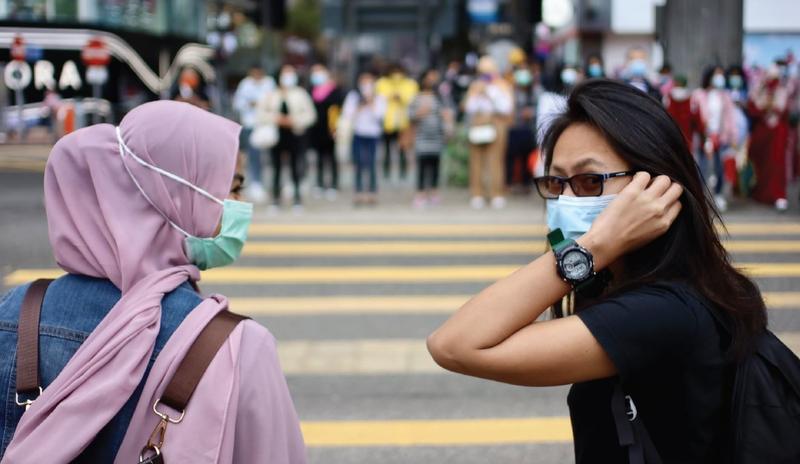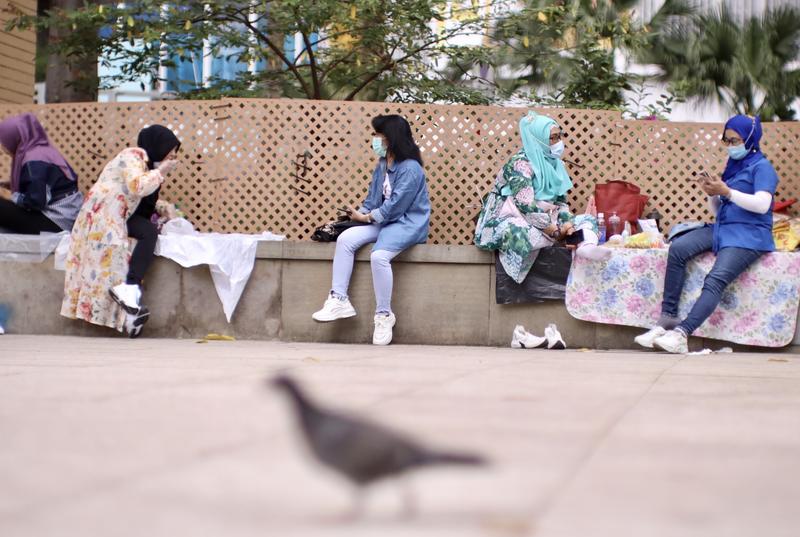 This undated photo captures foreign workers waiting to cross a street in Causeway Bay, Hong Kong. (EDMOND TANG / CHINA DAILY)
This undated photo captures foreign workers waiting to cross a street in Causeway Bay, Hong Kong. (EDMOND TANG / CHINA DAILY)
Mutated strains of the COVID-19 virus landed the Hong Kong government in hot water following official orders to test all unvaccinated foreign domestic workers and the later scrapped plan to make vaccinations a requirement for their work-visa renewal. The controversy has put the administration to the test, and shown the delicate balancing act between science, ethnicity and power in the attempt to control the virus.

The government on April 30 ordered all foreign domestic workers to undergo COVID-19 tests after identifying at least five helpers — as they are referred to colloquially — carrying a more transmissive variant. Nearly 340,000 of more than 370,000 foreign domestic workers in the city have since taken the test, in addition to about 40,000 who had been fully vaccinated and exempted from the mandatory testing, official figures show.
The government also floated a plan to make COVID-19 vaccinations mandatory for foreign domestic workers’ work visas, only to review and then withdraw it on Tuesday after public uproar and racism accusations. Hong Kong Chief Executive Carrie Lam Cheng Yuet-ngor said at a media briefing that the reversal was based on assessment of public health risks and consultation with Indonesian and Filipino consular offcials.
The total number of foreign domestic workers in Hong Kong, of whom Filipinos and Indonesians comprise more than 97 percent, stood at 370,837 in April, compared with 392,024 during the same period last year, according to Immigration Department data.
We support the campaign for a safe and healthy environment for all. But we’re really against making vaccinations mandatory because many concerns need to be addressed first. Why only target foreign domestic workers? What’s the point of having them vaccinated if their employers aren’t required to do so?”
Shiella Grace Estrada, Chairperson of the Progressive Labor Union of Domestic Workers in Hong Kong
Philippine Consul General Raly Tejada said mandatory vaccinations should be extended to all foreign workers, and not just domestic workers, to avoid claims of discrimination. “We support the campaign for a safe and healthy environment for all,” said Shiella Grace Estrada, chairperson of the Progressive Labor Union of Domestic Workers in Hong Kong, which represents Filipino, Indonesian, Thai and Nepalese domestic workers in the special administrative region. “But we’re really against making vaccinations mandatory because many concerns need to be addressed first. Why only target foreign domestic workers? What’s the point of having them vaccinated if their employers aren’t required to do so?”
ALSO READ: HK reviews mandatory vaccine plan for domestic workers
The government’s conciliatory response to the backlash has assuaged some public concerns. After the government said on May 4 that it would shelve the vaccination plan, the Mission for Migrant Workers said: “We continue to encourage the Hong Kong government to ensure that any policy it implements is in accordance with scientific analysis, fairness and proper consultation with the concerned communities and other stakeholders.”
But the controversy was renewed on Tuesday, when the government announced another round of testing for foreign domestic workers from May 15-31. The government said another round was needed due to the virus variants’ incubation period of up to 27 days, and that the Health Department wanted to make sure that there is no community transmission. In a statement, Tejada questioned the need for it, and said that it was “illogical” not to include the workers’ employers in the tests.
According to Tejada, Labour and Social Welfare Secretary Law Chi-kwong met the consuls general of the Philippines and Indonesia separately on Monday. Tejada said when asked why employers needed not be tested as well, Law replied that it was “a question of logistics” since there are about 1 million such employers in Hong Kong. “Law said that they learned from the last experience and will make the second round of mandatory testing more efficient and convenient,” he said.
Labor officials will ask employers to make appointments for their workers “so that there will be no rush and unnecessary crowding”, Tejada said. But he cautioned that it will “not go down well with the community”.
The Indonesian consulate called the testing an “unfair policy” in a statement. Shiella Grace Estrada also questioned the rationale behind the decision.
The ongoing saga has also revived discussions about foreign domestic workers’ rights protections, and the Hong Kong authorities’ treatment of this more vulnerable group in society.
The MFMW has urged the SAR government to take notice of the contributions and sacrifices of foreign domestic workers in Hong Kong society, especially during the pandemic. “We must unite in the fight against the pandemic and protect the vulnerable around us,” it said.
READ MORE: We’re all in this together — including domestic helpers
The Philippines and Indonesia earlier submitted a demarche requesting HKSAR authorities to enhance the well-being of foreign domestic workers amid the pandemic.
Foreign domestic workers have been more affected by social-distancing orders during the pandemic, as they tend to gather in parks and other public areas on their day off. Their cramped living conditions also posed new threats, providing fertile ground for the airborne and droplet transmission of the virus — a matter made worse by their having to live in designated facilities between employments.
 Workers have a break at Victoria Park in Causeway Bay. (EDMOND TANG / CHINA DAILY)
Workers have a break at Victoria Park in Causeway Bay. (EDMOND TANG / CHINA DAILY)
Substandard conditions
In a joint demarche personally submitted to the Officce of the Ombudsman on Feb 11, Tejada and Indonesian Consul General Ricky Suhendar pointed out the “substandard” condition of foreign domestic workers’ boarding houses after a cluster was linked to a facility in Tai Po in December. “(Some facilities) are overcrowded, unsanitary, and thus posing a hazard to their health and safety,” they said.
Ombudsman Winnie Chiu Wai-yin has launched an investigation into the HKSAR government’s regulations on the boarding houses, and invited all stakeholders to share their views.
Foreign domestic workers have been more affected by social-distancing orders during the pandemic, as they tend to gather in parks and other public areas on their day off. Their cramped living conditions also posed new threats, providing fertile ground for the airborne and droplet transmission of the coronavirus
“We are deeply concerned that a vulnerable community, such as the FDHs (foreign domestic helpers), has to live under these difficult circumstances, particularly during the ongoing COVID-19 pandemic,” the Philippine and Indonesian consuls general said in the demarche.
“The issues of substandard boarding facilities have become a collective concern among stakeholders for decades. While we notice that progress has been made in recent years, more needs to be done to upgrade the well-being of FDHs in the territory,” reads the demarche.
Tejada and Suhendar made eight “requests or recommendations” to better protect domestic workers from the pandemic and enhance their wellbeing.
“Since a proper boarding facility is one of the many issues affecting the health, safety and well-being of FDHs, we see that any effort to improve its condition must also take into account other related issues,” reads the demarche.
They asked Hong Kong authorities to allow domestic workers to stay with their new employers while waiting for the Immigration Department’s approval of their working visa “or, in the alternative, expediting the processing of via approval.”
READ MORE: HK govt scraps plan to tie vaccination to FDH visa
The consuls general also asked for the regular inspection of the boarding houses to ensure they are compliant with health and other safety regulations and for HKSAR authorities to consider subsidizing employment agencies to improve their boarding facilities for workers or “directly subsidizing FDHs to rent other facilities outside the EA’s facilities”.
They also appealed to employers for a “rotation of rest days”, suggesting that EA should provide “a substitute worker” during the workers’ day off.
Tejada said one of the top pressing concerns of Filipino workers was that some employers “were taking advantage of the pandemic as a reason” to prevent their workers from taking their day off.
“Through the efficient coordination mechanism between the consulate and the Hong Kong authorities, these employers had been strongly reminded by the Labour Department that they are still bound by the Hong Kong rules on the Standard Employment Contract and to abide by their duties and obligations, despite the pandemic,” he said.


